Case Study Analysis: Munny's Mental Health, Recovery, and Nursing
VerifiedAdded on 2022/09/14
|8
|2367
|13
Case Study
AI Summary
This case study focuses on Munny, a 45-year-old Cambodian man living in Western Sydney, presenting with mental health concerns. The assignment analyzes Munny's symptoms, including changes in behavior, affect, and mood, using components of a Mental State Examination (MSE). It explores potential predisposing factors like childhood trauma, loss of his mother, and job-related stress, linking these to the stress vulnerability model. The study also discusses the importance of respect, empowerment, and hope in mental health recovery, highlighting how these elements can be integrated into nursing interventions. The case study emphasizes the significance of a recovery-oriented approach and provides references to support the analysis. Munny's case underscores the multifaceted nature of mental health issues and the need for comprehensive, compassionate care.

Running head: NURSING
NURSING
Name of the Student
Name of the university
Author’s note
NURSING
Name of the Student
Name of the university
Author’s note
Paraphrase This Document
Need a fresh take? Get an instant paraphrase of this document with our AI Paraphraser
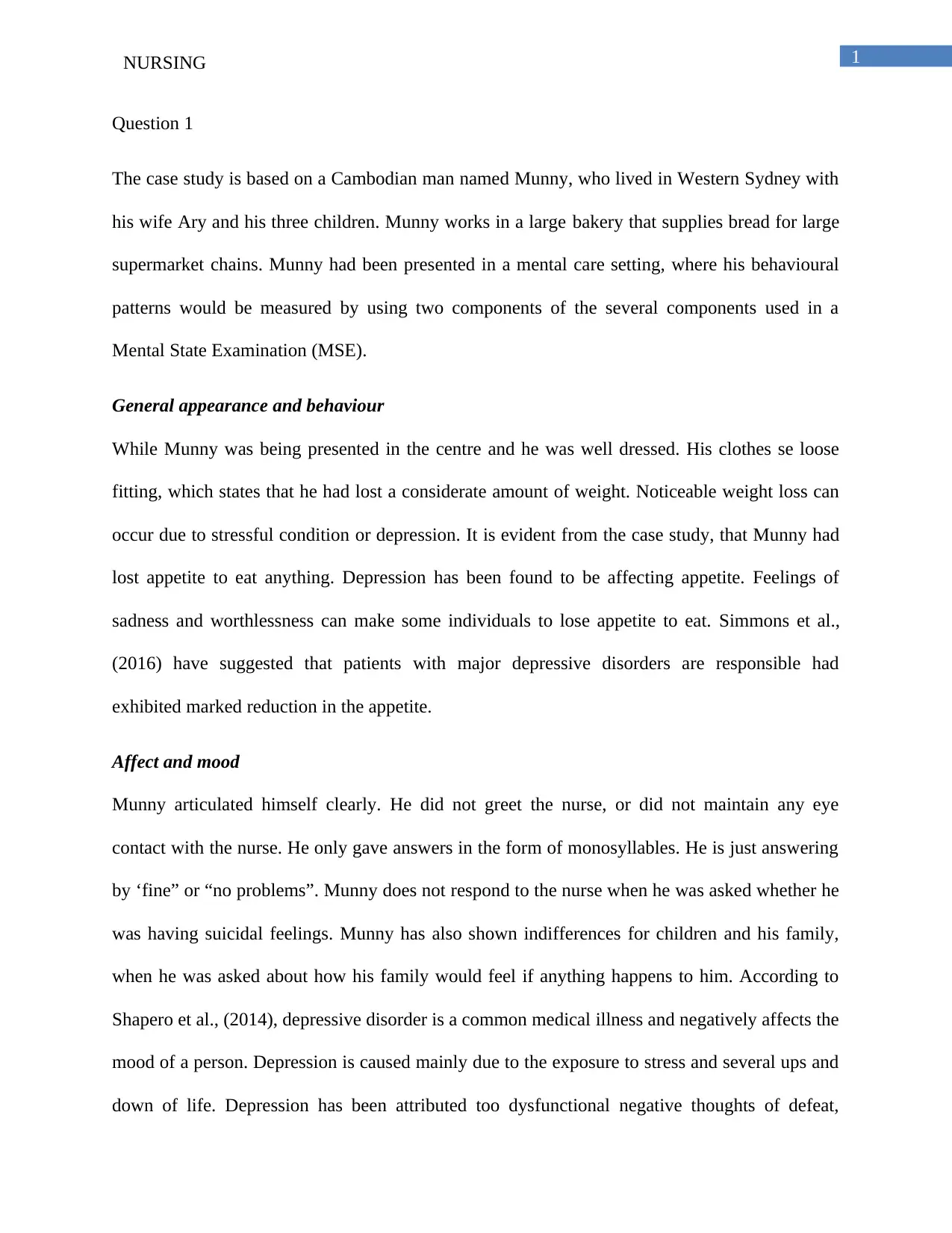
1NURSING
Question 1
The case study is based on a Cambodian man named Munny, who lived in Western Sydney with
his wife Ary and his three children. Munny works in a large bakery that supplies bread for large
supermarket chains. Munny had been presented in a mental care setting, where his behavioural
patterns would be measured by using two components of the several components used in a
Mental State Examination (MSE).
General appearance and behaviour
While Munny was being presented in the centre and he was well dressed. His clothes se loose
fitting, which states that he had lost a considerate amount of weight. Noticeable weight loss can
occur due to stressful condition or depression. It is evident from the case study, that Munny had
lost appetite to eat anything. Depression has been found to be affecting appetite. Feelings of
sadness and worthlessness can make some individuals to lose appetite to eat. Simmons et al.,
(2016) have suggested that patients with major depressive disorders are responsible had
exhibited marked reduction in the appetite.
Affect and mood
Munny articulated himself clearly. He did not greet the nurse, or did not maintain any eye
contact with the nurse. He only gave answers in the form of monosyllables. He is just answering
by ‘fine” or “no problems”. Munny does not respond to the nurse when he was asked whether he
was having suicidal feelings. Munny has also shown indifferences for children and his family,
when he was asked about how his family would feel if anything happens to him. According to
Shapero et al., (2014), depressive disorder is a common medical illness and negatively affects the
mood of a person. Depression is caused mainly due to the exposure to stress and several ups and
down of life. Depression has been attributed too dysfunctional negative thoughts of defeat,
Question 1
The case study is based on a Cambodian man named Munny, who lived in Western Sydney with
his wife Ary and his three children. Munny works in a large bakery that supplies bread for large
supermarket chains. Munny had been presented in a mental care setting, where his behavioural
patterns would be measured by using two components of the several components used in a
Mental State Examination (MSE).
General appearance and behaviour
While Munny was being presented in the centre and he was well dressed. His clothes se loose
fitting, which states that he had lost a considerate amount of weight. Noticeable weight loss can
occur due to stressful condition or depression. It is evident from the case study, that Munny had
lost appetite to eat anything. Depression has been found to be affecting appetite. Feelings of
sadness and worthlessness can make some individuals to lose appetite to eat. Simmons et al.,
(2016) have suggested that patients with major depressive disorders are responsible had
exhibited marked reduction in the appetite.
Affect and mood
Munny articulated himself clearly. He did not greet the nurse, or did not maintain any eye
contact with the nurse. He only gave answers in the form of monosyllables. He is just answering
by ‘fine” or “no problems”. Munny does not respond to the nurse when he was asked whether he
was having suicidal feelings. Munny has also shown indifferences for children and his family,
when he was asked about how his family would feel if anything happens to him. According to
Shapero et al., (2014), depressive disorder is a common medical illness and negatively affects the
mood of a person. Depression is caused mainly due to the exposure to stress and several ups and
down of life. Depression has been attributed too dysfunctional negative thoughts of defeat,
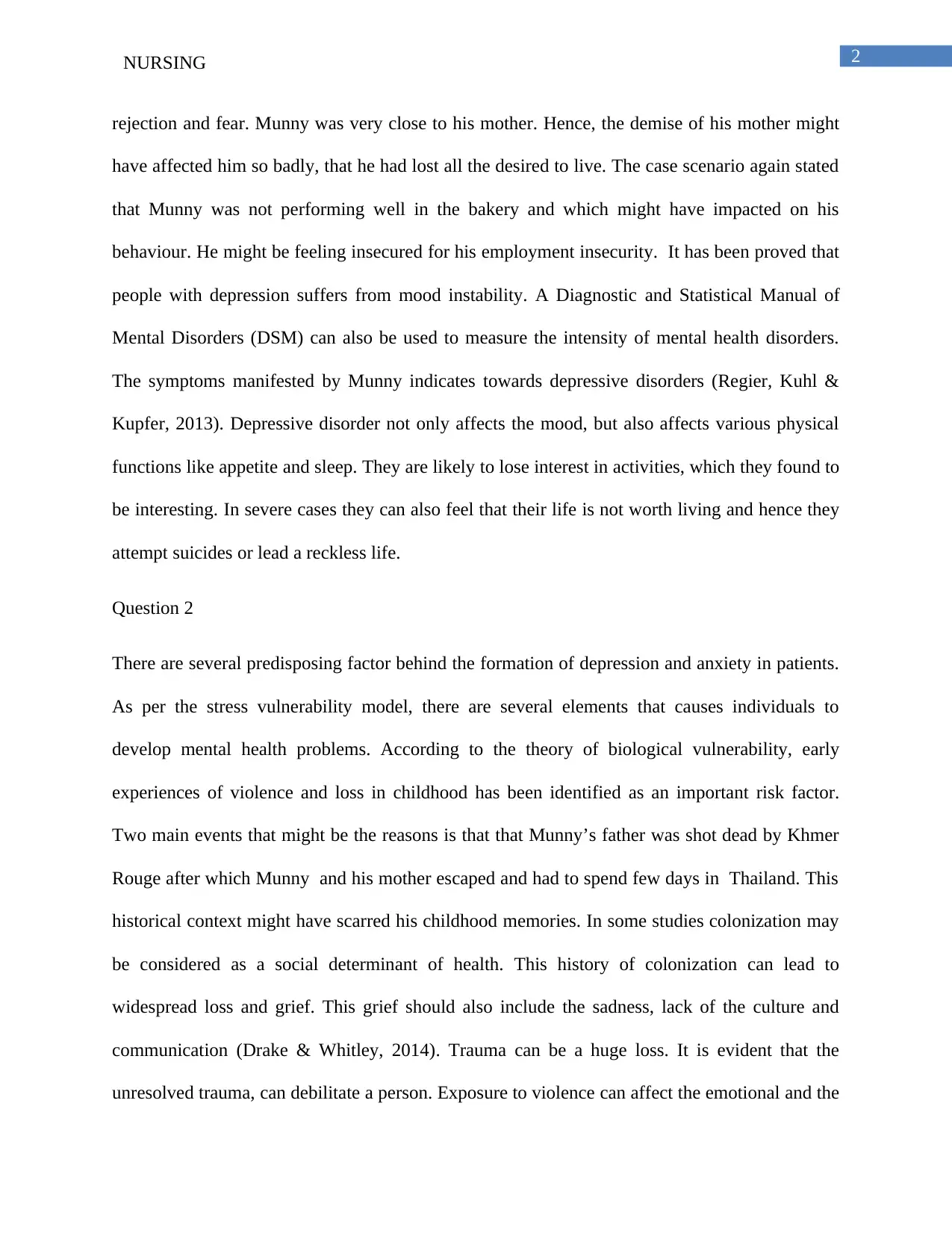
2NURSING
rejection and fear. Munny was very close to his mother. Hence, the demise of his mother might
have affected him so badly, that he had lost all the desired to live. The case scenario again stated
that Munny was not performing well in the bakery and which might have impacted on his
behaviour. He might be feeling insecured for his employment insecurity. It has been proved that
people with depression suffers from mood instability. A Diagnostic and Statistical Manual of
Mental Disorders (DSM) can also be used to measure the intensity of mental health disorders.
The symptoms manifested by Munny indicates towards depressive disorders (Regier, Kuhl &
Kupfer, 2013). Depressive disorder not only affects the mood, but also affects various physical
functions like appetite and sleep. They are likely to lose interest in activities, which they found to
be interesting. In severe cases they can also feel that their life is not worth living and hence they
attempt suicides or lead a reckless life.
Question 2
There are several predisposing factor behind the formation of depression and anxiety in patients.
As per the stress vulnerability model, there are several elements that causes individuals to
develop mental health problems. According to the theory of biological vulnerability, early
experiences of violence and loss in childhood has been identified as an important risk factor.
Two main events that might be the reasons is that that Munny’s father was shot dead by Khmer
Rouge after which Munny and his mother escaped and had to spend few days in Thailand. This
historical context might have scarred his childhood memories. In some studies colonization may
be considered as a social determinant of health. This history of colonization can lead to
widespread loss and grief. This grief should also include the sadness, lack of the culture and
communication (Drake & Whitley, 2014). Trauma can be a huge loss. It is evident that the
unresolved trauma, can debilitate a person. Exposure to violence can affect the emotional and the
rejection and fear. Munny was very close to his mother. Hence, the demise of his mother might
have affected him so badly, that he had lost all the desired to live. The case scenario again stated
that Munny was not performing well in the bakery and which might have impacted on his
behaviour. He might be feeling insecured for his employment insecurity. It has been proved that
people with depression suffers from mood instability. A Diagnostic and Statistical Manual of
Mental Disorders (DSM) can also be used to measure the intensity of mental health disorders.
The symptoms manifested by Munny indicates towards depressive disorders (Regier, Kuhl &
Kupfer, 2013). Depressive disorder not only affects the mood, but also affects various physical
functions like appetite and sleep. They are likely to lose interest in activities, which they found to
be interesting. In severe cases they can also feel that their life is not worth living and hence they
attempt suicides or lead a reckless life.
Question 2
There are several predisposing factor behind the formation of depression and anxiety in patients.
As per the stress vulnerability model, there are several elements that causes individuals to
develop mental health problems. According to the theory of biological vulnerability, early
experiences of violence and loss in childhood has been identified as an important risk factor.
Two main events that might be the reasons is that that Munny’s father was shot dead by Khmer
Rouge after which Munny and his mother escaped and had to spend few days in Thailand. This
historical context might have scarred his childhood memories. In some studies colonization may
be considered as a social determinant of health. This history of colonization can lead to
widespread loss and grief. This grief should also include the sadness, lack of the culture and
communication (Drake & Whitley, 2014). Trauma can be a huge loss. It is evident that the
unresolved trauma, can debilitate a person. Exposure to violence can affect the emotional and the
⊘ This is a preview!⊘
Do you want full access?
Subscribe today to unlock all pages.

Trusted by 1+ million students worldwide
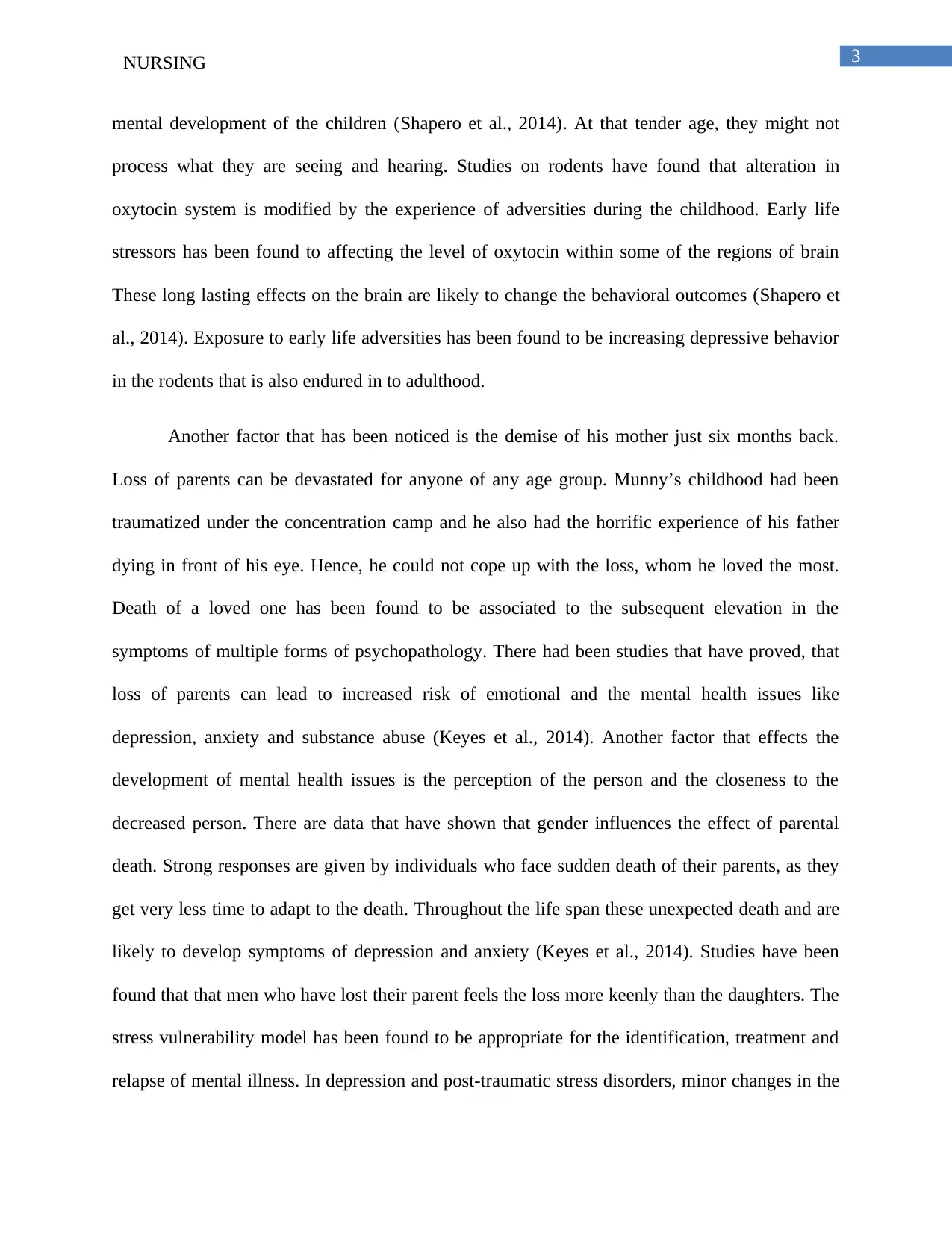
3NURSING
mental development of the children (Shapero et al., 2014). At that tender age, they might not
process what they are seeing and hearing. Studies on rodents have found that alteration in
oxytocin system is modified by the experience of adversities during the childhood. Early life
stressors has been found to affecting the level of oxytocin within some of the regions of brain
These long lasting effects on the brain are likely to change the behavioral outcomes (Shapero et
al., 2014). Exposure to early life adversities has been found to be increasing depressive behavior
in the rodents that is also endured in to adulthood.
Another factor that has been noticed is the demise of his mother just six months back.
Loss of parents can be devastated for anyone of any age group. Munny’s childhood had been
traumatized under the concentration camp and he also had the horrific experience of his father
dying in front of his eye. Hence, he could not cope up with the loss, whom he loved the most.
Death of a loved one has been found to be associated to the subsequent elevation in the
symptoms of multiple forms of psychopathology. There had been studies that have proved, that
loss of parents can lead to increased risk of emotional and the mental health issues like
depression, anxiety and substance abuse (Keyes et al., 2014). Another factor that effects the
development of mental health issues is the perception of the person and the closeness to the
decreased person. There are data that have shown that gender influences the effect of parental
death. Strong responses are given by individuals who face sudden death of their parents, as they
get very less time to adapt to the death. Throughout the life span these unexpected death and are
likely to develop symptoms of depression and anxiety (Keyes et al., 2014). Studies have been
found that that men who have lost their parent feels the loss more keenly than the daughters. The
stress vulnerability model has been found to be appropriate for the identification, treatment and
relapse of mental illness. In depression and post-traumatic stress disorders, minor changes in the
mental development of the children (Shapero et al., 2014). At that tender age, they might not
process what they are seeing and hearing. Studies on rodents have found that alteration in
oxytocin system is modified by the experience of adversities during the childhood. Early life
stressors has been found to affecting the level of oxytocin within some of the regions of brain
These long lasting effects on the brain are likely to change the behavioral outcomes (Shapero et
al., 2014). Exposure to early life adversities has been found to be increasing depressive behavior
in the rodents that is also endured in to adulthood.
Another factor that has been noticed is the demise of his mother just six months back.
Loss of parents can be devastated for anyone of any age group. Munny’s childhood had been
traumatized under the concentration camp and he also had the horrific experience of his father
dying in front of his eye. Hence, he could not cope up with the loss, whom he loved the most.
Death of a loved one has been found to be associated to the subsequent elevation in the
symptoms of multiple forms of psychopathology. There had been studies that have proved, that
loss of parents can lead to increased risk of emotional and the mental health issues like
depression, anxiety and substance abuse (Keyes et al., 2014). Another factor that effects the
development of mental health issues is the perception of the person and the closeness to the
decreased person. There are data that have shown that gender influences the effect of parental
death. Strong responses are given by individuals who face sudden death of their parents, as they
get very less time to adapt to the death. Throughout the life span these unexpected death and are
likely to develop symptoms of depression and anxiety (Keyes et al., 2014). Studies have been
found that that men who have lost their parent feels the loss more keenly than the daughters. The
stress vulnerability model has been found to be appropriate for the identification, treatment and
relapse of mental illness. In depression and post-traumatic stress disorders, minor changes in the
Paraphrase This Document
Need a fresh take? Get an instant paraphrase of this document with our AI Paraphraser
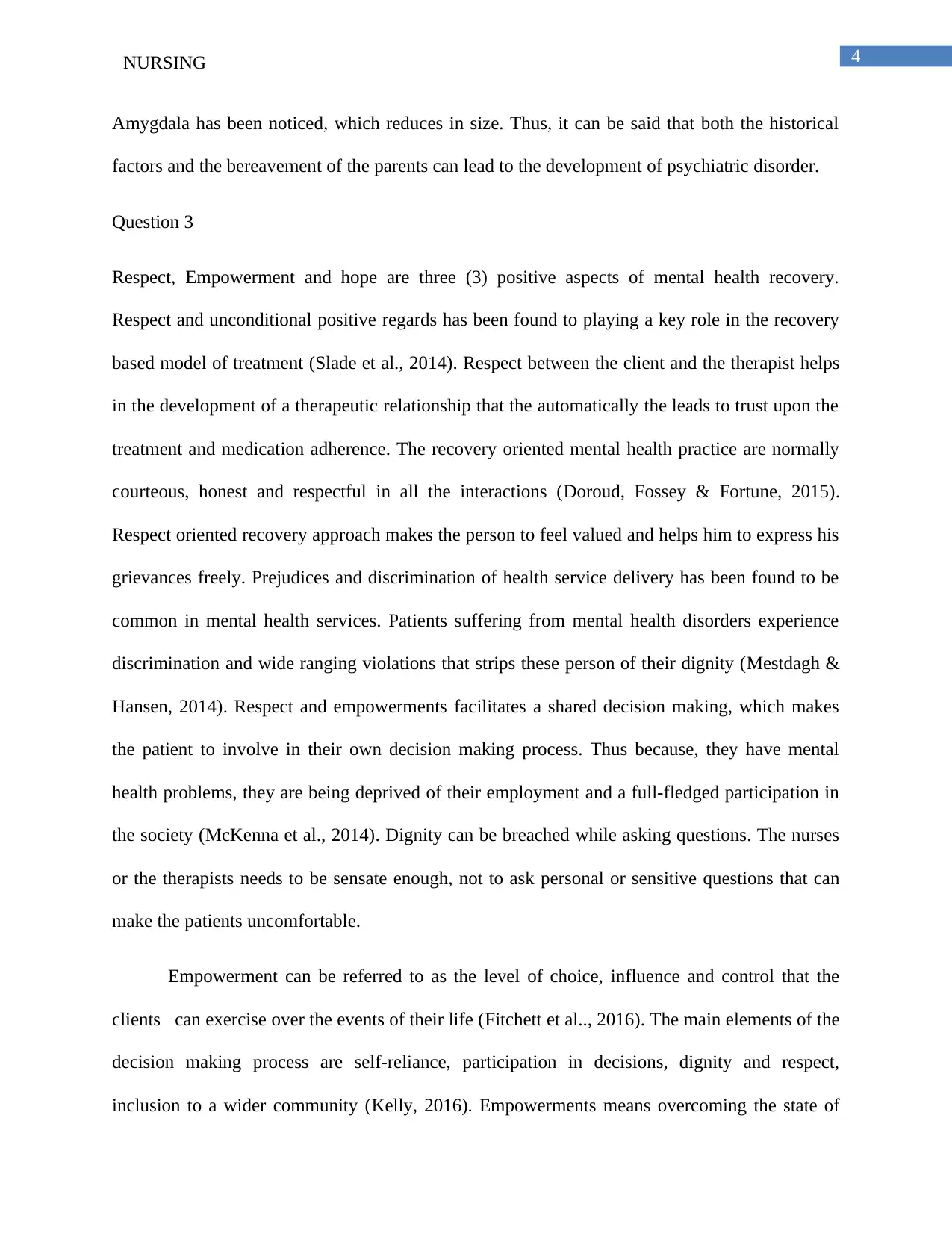
4NURSING
Amygdala has been noticed, which reduces in size. Thus, it can be said that both the historical
factors and the bereavement of the parents can lead to the development of psychiatric disorder.
Question 3
Respect, Empowerment and hope are three (3) positive aspects of mental health recovery.
Respect and unconditional positive regards has been found to playing a key role in the recovery
based model of treatment (Slade et al., 2014). Respect between the client and the therapist helps
in the development of a therapeutic relationship that the automatically the leads to trust upon the
treatment and medication adherence. The recovery oriented mental health practice are normally
courteous, honest and respectful in all the interactions (Doroud, Fossey & Fortune, 2015).
Respect oriented recovery approach makes the person to feel valued and helps him to express his
grievances freely. Prejudices and discrimination of health service delivery has been found to be
common in mental health services. Patients suffering from mental health disorders experience
discrimination and wide ranging violations that strips these person of their dignity (Mestdagh &
Hansen, 2014). Respect and empowerments facilitates a shared decision making, which makes
the patient to involve in their own decision making process. Thus because, they have mental
health problems, they are being deprived of their employment and a full-fledged participation in
the society (McKenna et al., 2014). Dignity can be breached while asking questions. The nurses
or the therapists needs to be sensate enough, not to ask personal or sensitive questions that can
make the patients uncomfortable.
Empowerment can be referred to as the level of choice, influence and control that the
clients can exercise over the events of their life (Fitchett et al.., 2016). The main elements of the
decision making process are self-reliance, participation in decisions, dignity and respect,
inclusion to a wider community (Kelly, 2016). Empowerments means overcoming the state of
Amygdala has been noticed, which reduces in size. Thus, it can be said that both the historical
factors and the bereavement of the parents can lead to the development of psychiatric disorder.
Question 3
Respect, Empowerment and hope are three (3) positive aspects of mental health recovery.
Respect and unconditional positive regards has been found to playing a key role in the recovery
based model of treatment (Slade et al., 2014). Respect between the client and the therapist helps
in the development of a therapeutic relationship that the automatically the leads to trust upon the
treatment and medication adherence. The recovery oriented mental health practice are normally
courteous, honest and respectful in all the interactions (Doroud, Fossey & Fortune, 2015).
Respect oriented recovery approach makes the person to feel valued and helps him to express his
grievances freely. Prejudices and discrimination of health service delivery has been found to be
common in mental health services. Patients suffering from mental health disorders experience
discrimination and wide ranging violations that strips these person of their dignity (Mestdagh &
Hansen, 2014). Respect and empowerments facilitates a shared decision making, which makes
the patient to involve in their own decision making process. Thus because, they have mental
health problems, they are being deprived of their employment and a full-fledged participation in
the society (McKenna et al., 2014). Dignity can be breached while asking questions. The nurses
or the therapists needs to be sensate enough, not to ask personal or sensitive questions that can
make the patients uncomfortable.
Empowerment can be referred to as the level of choice, influence and control that the
clients can exercise over the events of their life (Fitchett et al.., 2016). The main elements of the
decision making process are self-reliance, participation in decisions, dignity and respect,
inclusion to a wider community (Kelly, 2016). Empowerments means overcoming the state of
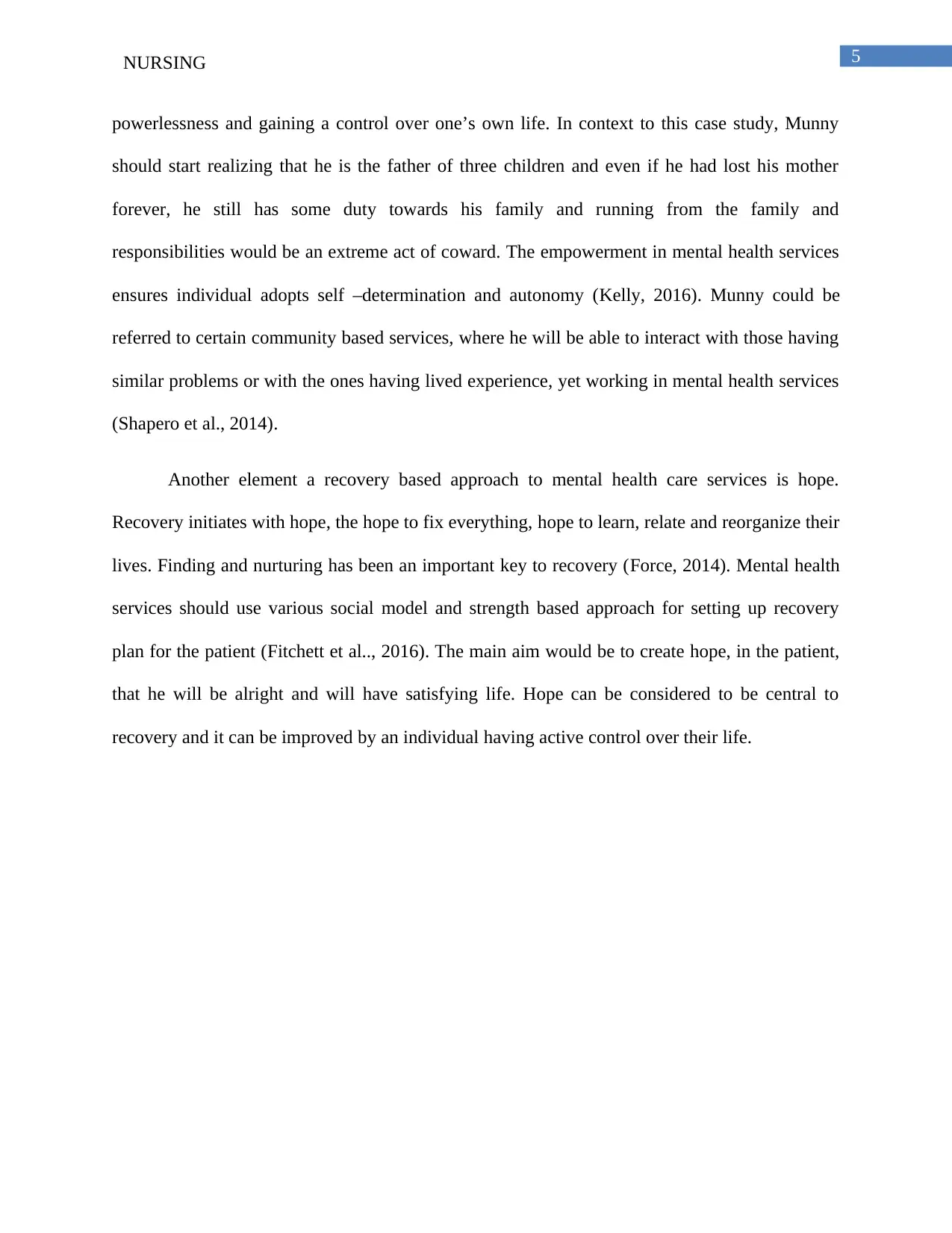
5NURSING
powerlessness and gaining a control over one’s own life. In context to this case study, Munny
should start realizing that he is the father of three children and even if he had lost his mother
forever, he still has some duty towards his family and running from the family and
responsibilities would be an extreme act of coward. The empowerment in mental health services
ensures individual adopts self –determination and autonomy (Kelly, 2016). Munny could be
referred to certain community based services, where he will be able to interact with those having
similar problems or with the ones having lived experience, yet working in mental health services
(Shapero et al., 2014).
Another element a recovery based approach to mental health care services is hope.
Recovery initiates with hope, the hope to fix everything, hope to learn, relate and reorganize their
lives. Finding and nurturing has been an important key to recovery (Force, 2014). Mental health
services should use various social model and strength based approach for setting up recovery
plan for the patient (Fitchett et al.., 2016). The main aim would be to create hope, in the patient,
that he will be alright and will have satisfying life. Hope can be considered to be central to
recovery and it can be improved by an individual having active control over their life.
powerlessness and gaining a control over one’s own life. In context to this case study, Munny
should start realizing that he is the father of three children and even if he had lost his mother
forever, he still has some duty towards his family and running from the family and
responsibilities would be an extreme act of coward. The empowerment in mental health services
ensures individual adopts self –determination and autonomy (Kelly, 2016). Munny could be
referred to certain community based services, where he will be able to interact with those having
similar problems or with the ones having lived experience, yet working in mental health services
(Shapero et al., 2014).
Another element a recovery based approach to mental health care services is hope.
Recovery initiates with hope, the hope to fix everything, hope to learn, relate and reorganize their
lives. Finding and nurturing has been an important key to recovery (Force, 2014). Mental health
services should use various social model and strength based approach for setting up recovery
plan for the patient (Fitchett et al.., 2016). The main aim would be to create hope, in the patient,
that he will be alright and will have satisfying life. Hope can be considered to be central to
recovery and it can be improved by an individual having active control over their life.
⊘ This is a preview!⊘
Do you want full access?
Subscribe today to unlock all pages.

Trusted by 1+ million students worldwide
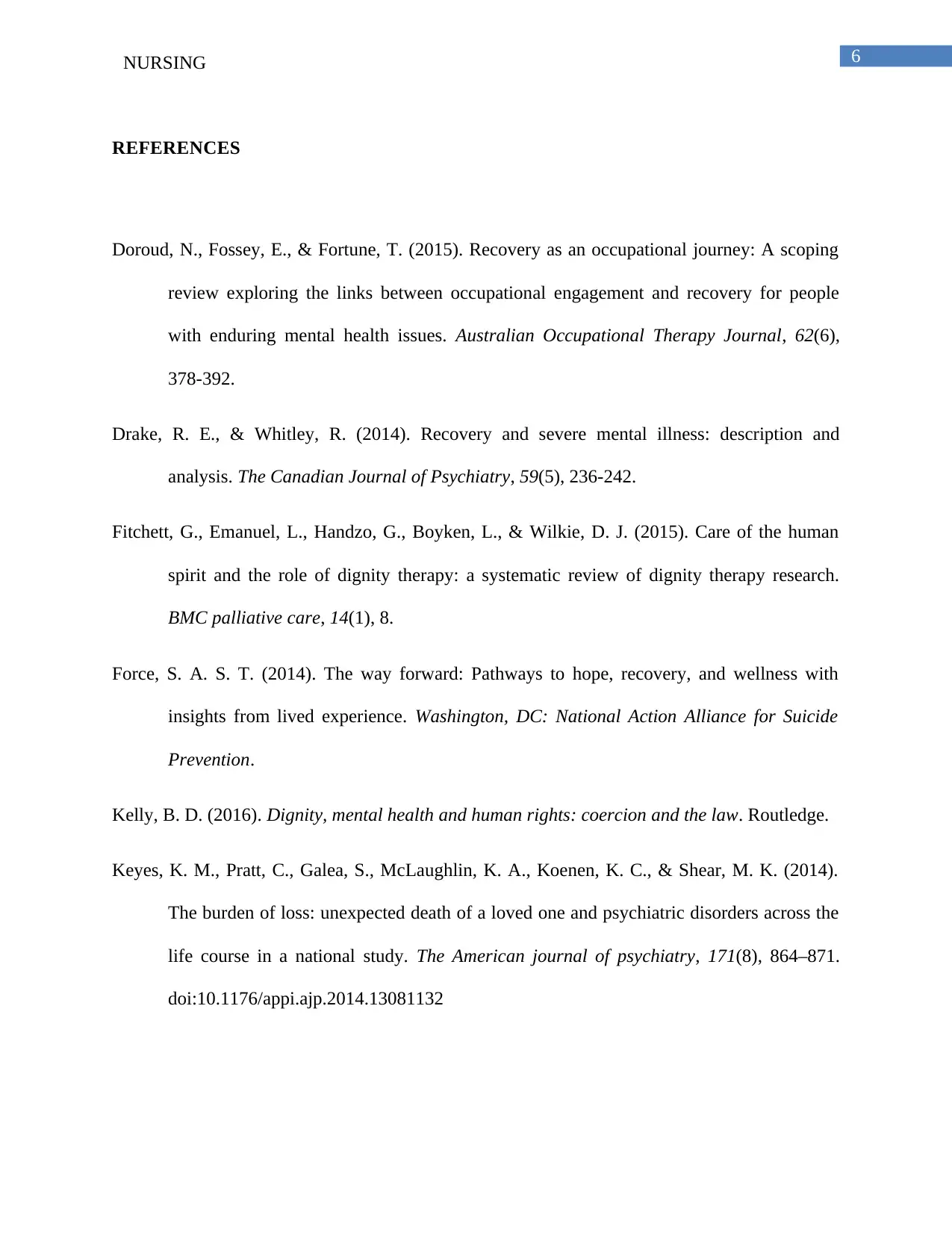
6NURSING
REFERENCES
Doroud, N., Fossey, E., & Fortune, T. (2015). Recovery as an occupational journey: A scoping
review exploring the links between occupational engagement and recovery for people
with enduring mental health issues. Australian Occupational Therapy Journal, 62(6),
378-392.
Drake, R. E., & Whitley, R. (2014). Recovery and severe mental illness: description and
analysis. The Canadian Journal of Psychiatry, 59(5), 236-242.
Fitchett, G., Emanuel, L., Handzo, G., Boyken, L., & Wilkie, D. J. (2015). Care of the human
spirit and the role of dignity therapy: a systematic review of dignity therapy research.
BMC palliative care, 14(1), 8.
Force, S. A. S. T. (2014). The way forward: Pathways to hope, recovery, and wellness with
insights from lived experience. Washington, DC: National Action Alliance for Suicide
Prevention.
Kelly, B. D. (2016). Dignity, mental health and human rights: coercion and the law. Routledge.
Keyes, K. M., Pratt, C., Galea, S., McLaughlin, K. A., Koenen, K. C., & Shear, M. K. (2014).
The burden of loss: unexpected death of a loved one and psychiatric disorders across the
life course in a national study. The American journal of psychiatry, 171(8), 864–871.
doi:10.1176/appi.ajp.2014.13081132
REFERENCES
Doroud, N., Fossey, E., & Fortune, T. (2015). Recovery as an occupational journey: A scoping
review exploring the links between occupational engagement and recovery for people
with enduring mental health issues. Australian Occupational Therapy Journal, 62(6),
378-392.
Drake, R. E., & Whitley, R. (2014). Recovery and severe mental illness: description and
analysis. The Canadian Journal of Psychiatry, 59(5), 236-242.
Fitchett, G., Emanuel, L., Handzo, G., Boyken, L., & Wilkie, D. J. (2015). Care of the human
spirit and the role of dignity therapy: a systematic review of dignity therapy research.
BMC palliative care, 14(1), 8.
Force, S. A. S. T. (2014). The way forward: Pathways to hope, recovery, and wellness with
insights from lived experience. Washington, DC: National Action Alliance for Suicide
Prevention.
Kelly, B. D. (2016). Dignity, mental health and human rights: coercion and the law. Routledge.
Keyes, K. M., Pratt, C., Galea, S., McLaughlin, K. A., Koenen, K. C., & Shear, M. K. (2014).
The burden of loss: unexpected death of a loved one and psychiatric disorders across the
life course in a national study. The American journal of psychiatry, 171(8), 864–871.
doi:10.1176/appi.ajp.2014.13081132
Paraphrase This Document
Need a fresh take? Get an instant paraphrase of this document with our AI Paraphraser
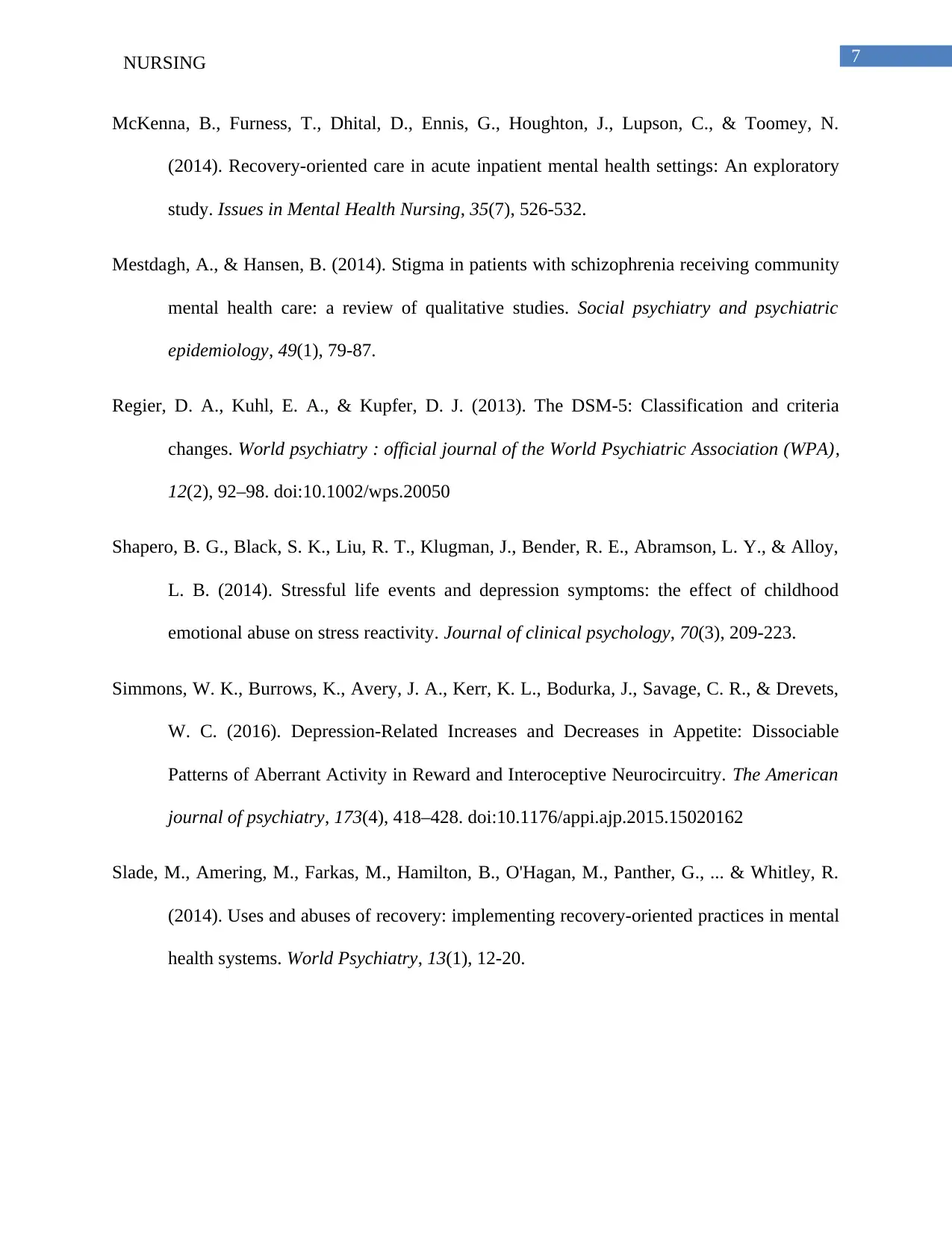
7NURSING
McKenna, B., Furness, T., Dhital, D., Ennis, G., Houghton, J., Lupson, C., & Toomey, N.
(2014). Recovery-oriented care in acute inpatient mental health settings: An exploratory
study. Issues in Mental Health Nursing, 35(7), 526-532.
Mestdagh, A., & Hansen, B. (2014). Stigma in patients with schizophrenia receiving community
mental health care: a review of qualitative studies. Social psychiatry and psychiatric
epidemiology, 49(1), 79-87.
Regier, D. A., Kuhl, E. A., & Kupfer, D. J. (2013). The DSM-5: Classification and criteria
changes. World psychiatry : official journal of the World Psychiatric Association (WPA),
12(2), 92–98. doi:10.1002/wps.20050
Shapero, B. G., Black, S. K., Liu, R. T., Klugman, J., Bender, R. E., Abramson, L. Y., & Alloy,
L. B. (2014). Stressful life events and depression symptoms: the effect of childhood
emotional abuse on stress reactivity. Journal of clinical psychology, 70(3), 209-223.
Simmons, W. K., Burrows, K., Avery, J. A., Kerr, K. L., Bodurka, J., Savage, C. R., & Drevets,
W. C. (2016). Depression-Related Increases and Decreases in Appetite: Dissociable
Patterns of Aberrant Activity in Reward and Interoceptive Neurocircuitry. The American
journal of psychiatry, 173(4), 418–428. doi:10.1176/appi.ajp.2015.15020162
Slade, M., Amering, M., Farkas, M., Hamilton, B., O'Hagan, M., Panther, G., ... & Whitley, R.
(2014). Uses and abuses of recovery: implementing recovery‐oriented practices in mental
health systems. World Psychiatry, 13(1), 12-20.
McKenna, B., Furness, T., Dhital, D., Ennis, G., Houghton, J., Lupson, C., & Toomey, N.
(2014). Recovery-oriented care in acute inpatient mental health settings: An exploratory
study. Issues in Mental Health Nursing, 35(7), 526-532.
Mestdagh, A., & Hansen, B. (2014). Stigma in patients with schizophrenia receiving community
mental health care: a review of qualitative studies. Social psychiatry and psychiatric
epidemiology, 49(1), 79-87.
Regier, D. A., Kuhl, E. A., & Kupfer, D. J. (2013). The DSM-5: Classification and criteria
changes. World psychiatry : official journal of the World Psychiatric Association (WPA),
12(2), 92–98. doi:10.1002/wps.20050
Shapero, B. G., Black, S. K., Liu, R. T., Klugman, J., Bender, R. E., Abramson, L. Y., & Alloy,
L. B. (2014). Stressful life events and depression symptoms: the effect of childhood
emotional abuse on stress reactivity. Journal of clinical psychology, 70(3), 209-223.
Simmons, W. K., Burrows, K., Avery, J. A., Kerr, K. L., Bodurka, J., Savage, C. R., & Drevets,
W. C. (2016). Depression-Related Increases and Decreases in Appetite: Dissociable
Patterns of Aberrant Activity in Reward and Interoceptive Neurocircuitry. The American
journal of psychiatry, 173(4), 418–428. doi:10.1176/appi.ajp.2015.15020162
Slade, M., Amering, M., Farkas, M., Hamilton, B., O'Hagan, M., Panther, G., ... & Whitley, R.
(2014). Uses and abuses of recovery: implementing recovery‐oriented practices in mental
health systems. World Psychiatry, 13(1), 12-20.
1 out of 8
Related Documents
Your All-in-One AI-Powered Toolkit for Academic Success.
+13062052269
info@desklib.com
Available 24*7 on WhatsApp / Email
![[object Object]](/_next/static/media/star-bottom.7253800d.svg)
Unlock your academic potential
Copyright © 2020–2026 A2Z Services. All Rights Reserved. Developed and managed by ZUCOL.





